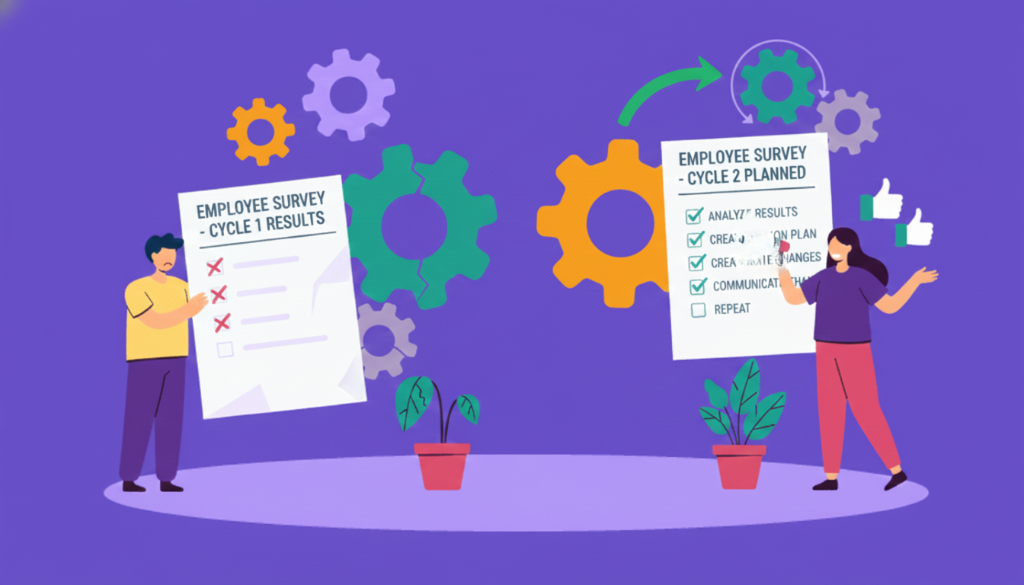Employee Performance Survey with 53 Sample Questions

A Global Employee Recognition and Wellness Platform
According to a study, nearly 75% of millennials are left unsure about their job performance or how to improve.
This indicates that many organizations still lack awareness when accurately assessing employee performance. As a result, both the employees and organizations bear the brunt of it.
So, if you are genuinely concerned about tracking your employees' performance or interested in gauging their opinions on their performance and overall satisfaction, employee performance surveys can be your go-to solution. These surveys are the simplest way to garner valuable insights and helpful feedback from your team.
So, let us know what an employee performance survey is all about.
What is an Employee Performance Survey?
An employee performance survey is a structured method of collecting feedback from employees concerning their performance, experiences, and perceptions within an organization.
The process basically seeks feedback from employees on various aspects of their job, including
- Job satisfaction
- Work environment
- Relationships with colleagues and supervisors
- Opportunities for growth.
These aspects play a significant role in influencing and molding the overall performance of employees. These surveys can take various forms, such as online questionnaires, interviews, or focus groups. The thumb rule for conducting these surveys include- keeping the survey concise, anonymous responses, objectives, and following up on the results.
These surveys are particularly driven by the following objectives:
- It helps you gauge how satisfied and engaged employees are in their roles.
- It identifies areas where employees excel and require improvements
- The insights gathered positively influence the decision-making processes within the organization for the better.
Recommended Read: 10 Best 360 Degree Feedback Software 2025
Employee Performance Survey Questions
Let's delve into impactful questions to include in your employee performance review survey that addresses different facets of work life. These questions can be presented in multiple-choice, Likert scale, or open-ended formats.
Effectiveness
- The goals and strategies of my organization are taking us in the right direction.
1 - Strongly Disagree
2 - Disagree
3 - Neutral
4 - Agree
5 - Strongly Agree
- The leaders of my organization have communicated a vision that motivates me.
1 - Strongly Disagree
2 - Disagree
3 - Neutral
4 - Agree
5 - Strongly Agree
- My organization supports high ethical standards.
1 - Strongly Disagree
2 - Disagree
3 - Neutral
4 - Agree
5 - Strongly Agree
- My organization's values are aligned with values I consider important in life.
1 - Strongly Disagree
2 - Disagree
3 - Neutral
4 - Agree
5 - Strongly Agree
- The leaders of my organization demonstrate that employees are important to its success.
1 - Strongly Disagree
2 - Disagree
3 - Neutral
4 - Agree
5 - Strongly Agree
- I understand how my role at my workplace correlates to the organization's success.
1 - Strongly Disagree
2 - Disagree
3 - Neutral
4 - Agree
5 - Strongly Agree
- How often do you feel that you meet the expectations set for your role?
- Very frequently
- Frequently
- Occasionally
- Rarely
- Never
- How successfully have you achieved your goals over the past performance period?
- Extremely successful
- Very successful
- Moderately successful
- Slightly successful
- Not successful
- How often do you encounter challenges in achieving your assigned goals?
- Never
- Rarely
- Occasionally
- Frequently
- Always
- How often do you receive feedback on the quality of your work?
- Always
- Often
- Sometimes
- Rarely
- Never
Skills & Knowledge
- On a scale of 1 to 5, how proficient do you feel in the core areas required for your role?
1- Lowest
2- Low
3- Moderate
4- High
5- Highest
-
Have you learned any new skills or techniques that have helped you perform your job more effectively? If yes, please specify.
-
Please rate your proficiency in each of your core skill areas on a scale of 1 (Novice) to 5 (Expert). (Include a list of relevant core skills for the specific role)
-
How empowered and supported do you feel in learning new skills relevant to your role?
-
Have you had the opportunity to participate in training or development programs recently? If so, how valuable were they?
Contribution & Teamwork
- My coworkers and I have a good working relationship.
1 - Strongly Disagree
2 - Disagree
3 - Neutral
4 - Agree
5 - Strongly Agree
- I can count on my coworkers to help when needed.
1 - Strongly Disagree
2 - Disagree
3 - Neutral
4 - Agree
5 - Strongly Agree
- My coworkers welcome opinions different from their own.
1 - Strongly Disagree
2 - Disagree
3 - Neutral
4 - Agree
5 - Strongly Agree
19.How often do you collaborate with your colleagues to solve problems or complete tasks?
- Very frequently
- Frequently
- Occasionally
- Rarely
- Never
- How would you rate your ability to support and assist your colleagues when needed?
- Excellent
- Good
- Average
- Below average
- Poor
-
Can you provide an example of a recent teamwork success or collaboration effort you were involved in?
-
How well do you feel your team communicates and collaborates to achieve common goals?
- Highly Effective
- Moderately Effective
- Somewhat Effective
- Not Effective
-
Share an example of a problem you encountered at work and how you successfully resolved it.
-
How comfortable are you taking the initiative and finding solutions to challenges in your work?
- Very Comfortable
- Somewhat Comfortable
- Neutral
- Somewhat Uncomfortable
- Very Uncomfortable
- How willing are your colleagues to help and support each other when needed?
- Always Willing
- Often Willing
- Sometimes Willing
- Rarely Willing
- Never Willing
Work Environment & Feedback
- My workplace is free from distractions and I find it easy to focus on my work.
1 - Strongly Disagree
2 - Disagree
3 - Neutral
4 - Agree
5 - Strongly Agree
- My workplace is comfortable and I feel safe working here.
1 - Strongly Disagree
2 - Disagree
3 - Neutral
4 - Agree
5 - Strongly Agree
- My manager and I have a good working relationship.
1 - Strongly Disagree
2 - Disagree
3 - Neutral
4 - Agree
5 - Strongly Agree
- My manager gives me enough feedback to understand if I am doing my job well.
1 - Strongly Disagree
2 - Disagree
3 - Neutral
4 - Agree
5 - Strongly Agree
- Management emphasizes teamwork within the organization.
1 - Strongly Disagree
2 - Disagree
3 - Neutral
4 - Agree
5 - Strongly Agree
- How satisfied are you with the overall work environment in your department/team?
- Very satisfied
- Satisfied
- Neutral
- Dissatisfied
- Very dissatisfied
- How effectively do you feel communication flows within the team and with your manager?
- Very effectively
- Effectively
- Neither effectively nor ineffectively
- Ineffectively
- Very ineffectively
- What are the aspects of your work environment that you enjoy most?
- Collaborative atmosphere and teamwork
- Opportunities for growth and learning
- Supportive management and colleagues
- Flexibility in work arrangements and schedules
- How clear and effective is communication between your manager and team leaders?
- Highly Effective
- Moderately Effective
- Somewhat Effective
- Not Effective
-
Do you feel comfortable communicating your ideas and concerns to your manager and colleagues? Why or why not?
-
How well does your manager provide you with the support, guidance, and resources you need to be successful in your role?
- Strongly Agree
- Agree
- Neutral
- Disagree
- Strongly Disagree
- What are some specific ways your manager could better support your professional development?
Employee Development
- I am satisfied with my opportunities for professional growth.
1 - Strongly Disagree
2 - Disagree
3 - Neutral
4 - Agree
5 - Strongly Agree
- I am satisfied with the job-related training my organization offers.
1 - Strongly Disagree
2 - Disagree
3 - Neutral
4 - Agree
5 - Strongly Agree
- I am satisfied that I have the opportunity to apply my talents and expertise.
1 - Strongly Disagree
2 - Disagree
3 - Neutral
4 - Agree
5 - Strongly Agree
-
What specific skills or knowledge do you aspire to develop in the next year?
-
How well do you feel your current role offers opportunities for professional growth and development?
- Strongly Agree
- Agree
- Neutral
- Disagree
- Strongly Disagree
- Would you be interested in pursuing additional responsibilities or taking on a leadership role within the company?
- Yes
- No
- Unsure
-
Are there any particular areas or skills you feel are lacking in your current role that you would like to improve upon through training or development programs?
-
Can you describe a project or task you'd like to undertake to further your professional development?
-
Please rate the current availability of training and development opportunities in the company.
1- Lowest
2- Low
3- Moderate
4- High
5- Highest
- How satisfied are you with the support provided by the company for your career growth and development?
- Very Dissatisfied
- Dissatisfied
- Neutral
- Satisfied
- Very Satisfied
Communication Plan
- Communication between senior management and employees is good in my organization.
1 - Strongly Disagree
2 - Disagree
3 - Neutral
4 - Agree
5 - Strongly Agree
- Which communication channels do you prefer to receive feedback through?
- In-person meetings
- One-on-ones
- Is the communication regarding company goals, objectives, and progress updates clear and timely?
1 - Strongly Disagree
2 - Disagree
3 - Neutral
4 - Agree
5 - Strongly Agree
-
Do you have any suggestions for improving communication within the company or your team?
-
How often would you like to receive updates or results about your performance or projects?
- Weekly
- Bi-weekly
- Monthly
- Quarterly
- Can you provide any suggestions for improving the current communication process regarding performance evaluation and feedback sharing?
Employee Performance Survey Features
Let's explore the diverse features that contribute to employee performance.
-
Employee satisfaction: Surveys have the potential to gauge how satisfied employees are with their work, work environment, leadership, and other aspects.
-
Customization: Survey questions can be aligned to the organization's goals, values, and specific performance criteria relevant to the employee's role and responsibilities.
-
Confidentiality and Anonymity: Anonymity and confidentiality of responses encourage employees to be honest and candid about their feedback. It fosters a culture of trust and openness.
-
Regular Frequency: Conducting employee performance surveys regularly will keep track of progress over time and aid in adapting strategies for continuous improvement.
According to a study by BetterWorks, Companies that adopt continuous performance feedback significantly outperformed competition at a 24% higher rate.
-
Integration with Performance Management Systems: Integrating survey data with performance management systems helps streamline the evaluation process, track progress, and facilitate informed decisions regarding rewards, promotions, and career development opportunities.
-
Evaluating policies: Surveys can determine how effective HR policies, procedures, and programs are from employees’ perspectives. This gives a glimpse into whether changes are necessary or not.
-
Benchmarking: Standardized survey metrics facilitate comparison of results against industry benchmarks and past performance. This helps measure progress.
-
Identifying problem areas: They highlight areas that require immediate attention, such as communication issues, lack of tools and resources, manager effectiveness concerns, etc.
-
Effective Communication: Employees should be clearly communicated about the goals or any form of information regarding the survey.
-
Leadership involvement: Leaders should extend their support of the survey process and stay committed to acting on the results.
-
Follow-up: Effectively closing the feedback loop by communicating outcomes and actions to employees helps foster trust and engagement.
-
Actionable Insights: The survey identifies strengths, weaknesses, and areas for improvement. The data-driven insights help make informed decisions.
Now, you may wonder whether there are any suitable platforms that will cater to both these features and your requirements. Indeed, there are various tools available to help you with surveys, including Vantage Pulse, Tinypulse, Empuls, Culture Amp, and others.
Recommended Resource: Top 20 Employee Pulse Survey Tools
Conclusion
In a nutshell, a systematic performance survey for employees is an essential tool for organizations that want to-
- Build a high-performance culture and
- Maximize the potential of their employees.
Now, it's your time to harness the full potential of performance surveys to attain greater results for both employees and your organization's growth.
FAQs
How can organizations encourage employee participation in performance surveys?
Organizations can encourage participation in the following ways-
- Emphasizing the importance of feedback
- Ensuring anonymity
- Providing incentives and
- Communicating the purpose and benefits of the survey.
What steps should organizations take after receiving feedback from employee performance surveys?
Organizations should analyze survey results, communicate their findings to employees, develop action plans based on feedback, implement changes, and monitor progress over time.

















